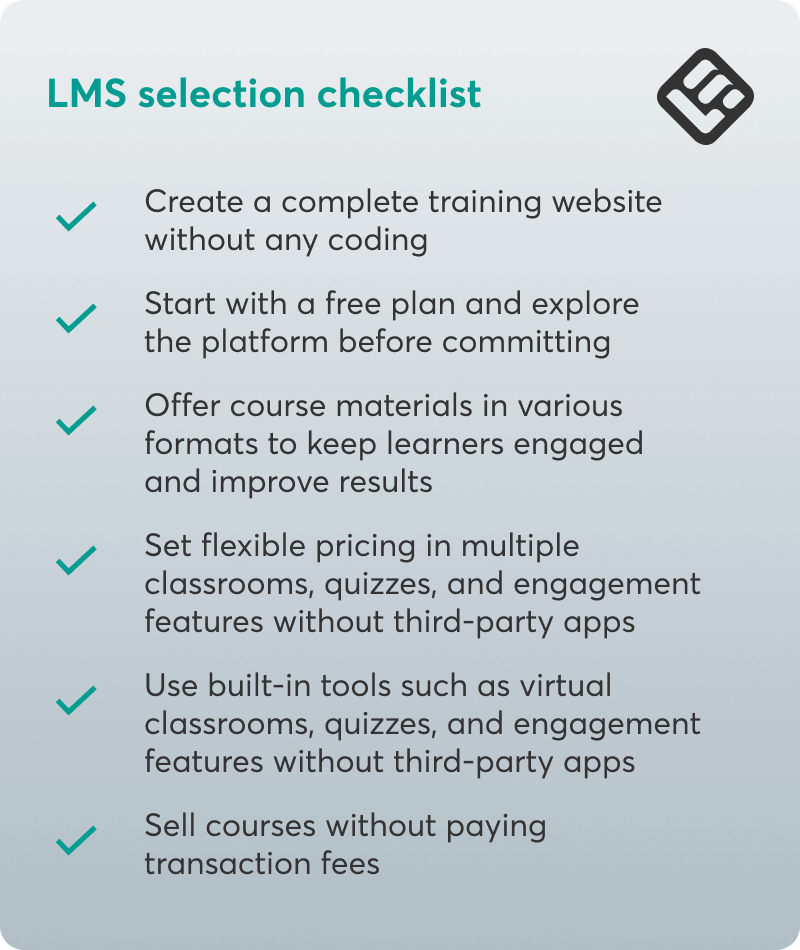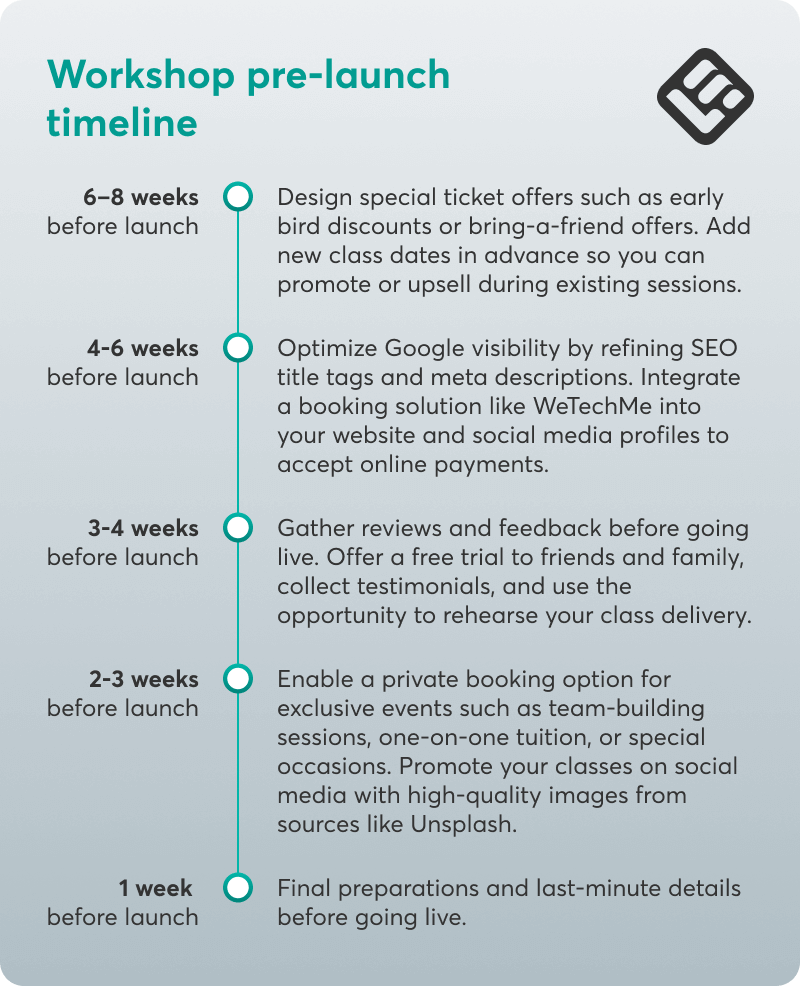Table of Contents
You might wonder if it’s even worth selling online courses or workshops with so much competition out there. The short answer is yes. The longer answer is that it needs to be planned carefully and delivered with intention.
Workshops that succeed aren’t thrown together at the last minute. They’re built on a clear idea, an engaged audience, and a structure that makes people want to sign up, show up, and tell others about it. With the right preparation, your workshop can stand out in a crowded market and bring real value to both you and your participants.
To help you out, we’ve created a guide that explains how to sell workshops online. It includes tips and stories from experts, checklists, and a few educational videos.
How to set up your workshop offer
So, first, let’s go through the steps you need to take to set up your online workshop offer.
1. Define the workshop type & format
‘Type’ and ‘format’ are connected, but they’re not the same thing. The type is about the goal and content of your workshop. Some examples include:
Some types make more sense if you sell to individuals. Others work better for businesses or established groups. Your type will often hint at the most suitable format, or at least help you narrow down the options.
Format is about how you run the workshop. You might go with in-person, virtual, or something in between. Sometimes the topic itself makes the choice obvious—mindfulness retreats, for example, work best face-to-face. Other workshops can be run entirely online, as a digital product. You can also combine both, starting with a virtual introduction and meeting in person for the core part.
Deciding on your type and format early will make all other decisions easier – from knowing where to sell and promote your workshop, to picking the tech stack you’ll use.
2. Validate your idea and build your target audience
Before you create your workshop, make sure people actually want it and are willing to pay for it. Skipping this step is a quick way to waste months building something no one buys.
If you already have the following, start there. Ask your followers what they’d like to learn about. This is one of the most effective and lowest-risk ways to find a winning topic. If you don’t yet have an audience, look at conversations that are happening in niche communities like Facebook groups, Slack channels, Reddit threads, or Discord servers. Join discussions, ask questions, and take note of recurring problems people try to solve.
Austin Rulfs, Founder of Zanda Wealth, has run property investment and finance workshops for years. He’s clear about the role of validation:
“The key to a successful launch of a workshop is to validate the interest of your audience. I do short live Q&As or surveys a few weeks ahead so I can understand what the specific pain points and intended results are.”
He notes that this approach shapes the content and also makes participants feel part of the workshop’s creation. In one case, this early engagement boosted registrations by more than 40%.
Turn to marketplaces for inspiration before you start selling
Marketplaces like Coursera and Udemy can also help you spot demand. If an online course in your subject area has thousands of enrollments, that’s a strong sign of interest. The trick is to offer something better, perhaps covering the topic in more depth or making it more practical. But this should give you a good idea about the learning objectives of your future workshop.
Build your target audience ahead of time
It is just as important as validating your idea. Colleen Barry, Head of Marketing at Ketch, says the most valuable pre-launch step is “warming them up with relevant, bite-sized content”—like short videos, quick tips, or behind-the-scenes glimpses related to your topic.
For her “Data Privacy in Practice” workshop, she shared weekly mini case studies and polls on LinkedIn two weeks before launch. This built anticipation and revealed what people cared about most. “When we opened registration, we hit 60% capacity in the first 48 hours,” she says.
How to choose the right platform for your online course business
If you’re thinking, “where is the best platform to sell online courses?”, you have three options to choose from. Here are the upsides and downsides of each.
1. Use an online marketplace like Udemy or Skillshare
Might be a good choice if you don’t have a following yet and/or lack a budget for self-hosting or promoting your course with paid ads.
The downside:
Also, keep in mind that marketplaces like Udemy take a significant share of your earnings in exchange for greater exposure. While this can be useful when you’re just starting out, it’s usually best to transition to hosting your courses independently once you’ve built a solid following.
2. Host it entirely yourself on a platform like WordPress
It might be a good idea if you already have a strong following and a number of workshops or courses you’d like to sell.
The downside:
While this option gives you full autonomy over your own website, course content, and data, it might not be sustainable in the long run. As your business grows, so will your costs, like integrations, data security, hosting, etc. There will be a lot of pressure on you to make sales quickly to cover the expenses.
3. Use a dedicated Learning Management System (LMS)
This is, arguably, the best choice as it can be ideal for those who:
The latter was the case for Learning Liaisons Founder, Dr. Jason Ampel, who helps students and teachers prepare for Florida State Certification exams. He originally hosted his online education business independently, on WordPress, but moved to the LMS from LearnWorlds. He says:
Also, here’s a quick cheat sheet that can help you select the right LMS:

If you need help choosing the right online course platform, here’s a quick recap. Take a look at this table.
How to craft a compelling workshop experience
Below are five tips that will help you make your workshop more engaging. Let’s start with the most important one.
1. Create a curriculum
Your curriculum is the roadmap for the entire workshop—for both you and your attendees. Start by outlining the key points you’d like to cover. It should set the sequence of topics, planned activities, and an estimate for how long each module will take. This helps you stay on track while keeping enough flexibility for discussions and questions.
Treat your workshop outline as a repeatable template. It will help you maintain consistency and make it easier to run future sessions without starting from scratch every time. Not to mention, the more workshop sessions you go through, the more prepared and well-organized the experience will be for participants.

That said, be careful not to overfill your agenda. Discussions and exercises often take longer than planned, so leave some extra time to keep the session engaging and avoid it from feeling rushed.
Need help? Watch this video: Step-by-step guide to building online courses with LearnWorlds
2. Present the goals and objectives consistently throughout the workshop
One of your main roles as a workshop organizer is to keep participants invested. This is true of all workshop formats, whether the experience is taking place in-person, virtually via an online course platform, or in a hybrid setting.
It starts with your very first interaction. Clearly state the main goal for the entire workshop and for each module.
💡For example, if you’re teaching others how to get better at public speaking, you could say:
“Today’s goal is to practice techniques for managing nerves and engaging your audience.” This sets expectations and gives everyone a shared focus.
Once that’s clear, offer a quick overview of how the workshop will flow and what attendees will do, like:
“We’ll begin with exercises to reduce anxiety, then explore ways to connect with listeners, and finish by practicing short presentations.” That way, participants can see the bigger picture and understand their role.
Workshops are about doing, so every agenda item should encourage action. Depending on the subject, consider activities like brainstorming, sketching, group voting, or role-playing.
If it’s a semi-self-paced workshop, you can also incorporate such activities into each key module. For example, if it includes prerecorded content, build in participation through interactive elements like pop quizzes or self-paced assignments you’ll review later.
Also, check in with the group regularly, by asking questions like “Does this goal make sense to you?” or “Is there anything you want to add or clarify?”
This will let you keep the specific group of attendees happy with the experience, gather feedback, and, if needed, improve future sessions.
3. Account for different outcomes
No two workshops ever play out exactly the same. They’re more like living organisms than scripted presentations. Different participants will have different needs. Some might quickly get certain assignments right, while others will require extra time or guidance.
Instead of seeing it as a challenge, think of it as an opportunity to adapt and improve. Use a platform that lets you customize or personalize the experience if needed—whether that’s uploading extra resources, offering additional explanations, or even scheduling one-on-one support.
In essence, pay attention to where participants repeatedly struggle or shine. This insight can help you fine-tune your workshop for future sessions.
4. Improve through feedback
The work doesn’t end once your workshop goes live. A successful online course evolves based on what participants actually need—not just what you thought they needed at the start.
Pay attention to how people engage during your sessions. Are certain topics sparking more questions? That’s a signal you can use. Add a highly-demanded module, extend a live Q&A, or include extra practice exercises if that’s what your audience is asking for.
Direct feedback is gold. Make it easy for participants to share their thoughts. Send a short post-session survey, ask a few targeted questions in a follow-up email, or have a quick conversation at the end of a live call. Look for patterns in their responses. If several people suggest the same improvement, it’s worth acting on.
5. Hint at ‘what’s next’
Offer meaningful extras to give participants a reason to stay connected with you and to sign up for your next program.
Bonuses are a simple place to start. Extra resources, templates, or toolkits can make attendees feel like they’ve walked away with more than the core material. The key is relevance. A bonus should help them apply what they’ve learned faster or more effectively, not just pad your offer.
Community access is another powerful incentive. A private group or members-only forum lets participants ask questions, share progress, and get support from peers who are on the same path. The social element makes the learning stick and keeps your name in their feed long after the workshop is over.
Certification can also be a draw. For many people, a certificate is more than a piece of paper, it’s proof of achievement, something to add to a CV or post on LinkedIn. It’s a tangible reminder of the time and effort they invested, and it subtly positions your workshop as a professional-level program.
How to promote your workshop
Even the best workshop won’t sell itself—you need to promote it to catch your target audience’s attention. But where can you start? Here are a few ideas.
1. Take advantage of other people’s audience
If you don’t yet have a large audience of your own, borrow one:
2. Strategic partnerships are also a good idea
According to Daniel Shapiro, SVP of Brand Relationships and Strategic Partnerships at RedPoints, the most effective promotion blends credibility, urgency, and targeted reach.
Partnerships with trusted brands or influencers help you tap into warm audiences. Limited-time bonuses or early-bird pricing create urgency. And tailoring your message to different audience segments beats a generic blast every time.
When they promoted “Brand Protection in the Digital Age”, the team “partnered with two ecommerce associations, offered a 48-hour early-bird discount, and ran tailored LinkedIn campaigns for brands, marketplaces, and legal teams.” This combination, he says, “drove a 35% higher attendance rate compared to our previous campaigns.”
3. Lead with value before the pitch
Dirk Alshuth, CMO of emma, recommends giving value first. Before launching their “Optimizing Hybrid Cloud Management” workshop, his team published short LinkedIn articles on avoiding common multi-cloud pitfalls, then partnered with two cloud alliances to promote the event. This “give before you ask” strategy drove a 40% higher registration rate.
4. Use social proof to seal the deal
Don’t overlook testimonials from previous students. Short quotes about how the workshop helped them or specific results they achieved can tip hesitant prospects over the line. Place these on your registration page, in your social media posts, and inside your email marketing sequence to build trust and credibility.
Launch timeline & operations
Here are a few final considerations, including the timeline for your workshop and a few legalities that you need to be aware of.
1. Create a waitlist
What’s the ideal lead time before launching?
If you want your workshop to sell out, start building interest early—much earlier than you think.
Moattar Ali, Vice President of Marketing at HARO Links Builder, has run over 15 digital workshops for more than 5,000 professionals. His advice is: “create your waiting list 90 days before the launch, not 30.”
Instead of waiting until the course is ready, Ali begins three months ahead. He posts behind-the-scenes updates, asks his audience about their challenges, and collects email addresses from anyone interested. That early start has made a big difference. He’s seen a 340% jump in sign-ups compared to shorter launch periods.
When he launched “Strategic Content Marketing for B2B”, Ali started teasing ideas 12 weeks before opening registration. By launch day, 847 people were on the waitlist, and all 150 seats sold out in just six hours. His golden rule is to use the pre-launch period as content delivery, not promotional noise.
💡Read also: How to create a pre-launch marketing strategy for your online courses
2. Send confirmation emails, reminders, and follow-ups
Send a warm confirmation email the moment someone joins. Make it feel personal and include the essentials like date, time, access link, and any prep they should do. Build excitement with a reminder a few days before the workshop and a final nudge on the day itself, so no one forgets. After the event, reach out with a thank-you note, share any promised resources, and invite quick feedback through a short survey while the workshop is still fresh in their mind.
3. Address all the legalities on your course landing page before you launch
It’s important to handle the less exciting parts too—like legal matters—before you launch your workshop. Taking care of these details early protects your business and helps build trust with your participants. We’re going to cover a few general rules that apply to anyone, regardless of where you’re based.
Let’s start off by answering a few very important questions.
Do you need a license to create and sell online courses?
It’s impossible to give a simple “yes” or “no,” because the term “license” can mean different things. It might refer to being formally registered as a business or holding professional credentials as an individual.
If you’re wondering about the first case, then it largely depends on your local legislation. Your country might require you to register a company or a home-based business to sell a specific service or product.
When it comes to professional credentials, running an online workshop generally doesn’t require anything more than what’s needed for an in-person one. That said, some fields, like finance or healthcare, often demand that workshop organizers have specific certifications or meet strict compliance standards.
There’s another nuance worth noting. If your workshop offers participants a certificate they can use to prove their skills or knowledge. If so, then you may need to be licensed or registered yourself for that certificate to carry any weight. A credential issued by a recognized individual or organization will hold far more value than one from an unknown, unregistered source.
Remember the refund policy
Secondly, we advise that you pay extra attention to your refund policy. Be clear about who can get a refund, how long they have, and under what conditions. Clear policies reduce confusion and show you’re professional. They also build trust—especially since people often look closely at refund terms when they’re not familiar with the course creator or brand. Make sure your policy aligns with consumer laws in the regions where you’re selling.
Secure your data
Next, think about data security. You’ll collect personal info like names, emails, or even payment details, so it’s your responsibility to keep that data safe. Depending on your audience’s location, laws like GDPR or CCPA may apply. Using a platform that offers a white-label course solution can simplify this—you can use your own domain name, imprint your brand identity, and take full control of the customer experience without worrying about the technical side of data security.
Consider copyrighting your content
Finally, protect your content and brand. Copyrights cover your course materials, and trademarks protect your branding. These rules prevent others from copying your work and add value to your business.
Stay wary of violating anyone else’s copyrighted content, too. Sometimes it can be hard to weigh what kind of information is trademarked or in the public domain. So, if you’re unsure of anything, consult with a legal professional. Ideally, someone who has helped other educators or specialists in your sector create online courses or workshops.
Bonus: a simple pre-launch planning timeline
If you are still wondering how to sell out a workshop, start by making the value and outcome clear. Share it with the right audience through channels they already trust, such as your email list, social media, or partner networks. Add urgency with limited spots or early-bird offers, and use testimonials to build trust.
Here’s a simple pre-launch timeline you can follow to fill every seat in your workshop.

Turn your online workshop idea into a profitable online business
If you’re new to workshop creation, the best choice is using a dedicated Learning Management System like LearnWorlds. Unlike with marketplaces, you’ll retain full control over your course material and data from Day One—but won’t have to worry about coding a website from scratch.
Give LearnWorlds a try on a free trial to see how quickly you can set up your website and launch your first workshop.

Kasia Kowalska & Anna Rubkiewicz
Kasia and Anna from Contentki are a content duo working with tech and SaaS brands from all over the world. With experience in sales, marketing, and product, they create content that’s packed with insights and practical tips. Their goal is to help brands share their expertise and build trust while keeping things engaging and approachable.
FAQ
Everything you have ever wondered, but were too afraid to ask...
Keep your pricing simple but strategic. Start with a base price that reflects the real value of your workshop, not just your time. Use an early-bird discount with a firm deadline to drive urgency and secure sign-ups. To increase appeal, add genuinely useful bonuses like a Q&A session, templates, or a consultation while avoiding filler extras.
What’s best depends on your experience with workshops, their format, and type. Here are the main options to choose from:




